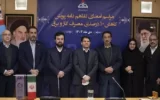
Emphasizing the strategic position of the Kharg Oil Terminal, the CEO of the Iranian Oil Terminals Company introduced transformation and innovation as the company's main strategies, and considered special attention to human resources as the key to development and improving productivity.

During a ceremony to address the gas imbalance crisis, the National Petrochemical Company and Zagros Petrochemical Company signed a memorandum of understanding. The aim of this memorandum is to reduce gas consumption by 10 percent in the domestic and commercial sectors and increase the share of gas allocated to the petrochemical industry, which could lead to increased production and foreign exchange earnings. This is while the petrochemical industry is facing challenges such as gas outages at 12 petrochemical plants and feed shortages.

The Deputy Minister of Oil for Gas Affairs said: "According to the predictions made on Thursday and Friday this week, gas consumption will peak, which shows the need for consumption management."

A tripartite memorandum of understanding for the implementation of the Note to Article 13 of the Economic Council's resolution for the plan to revive closed and low-yielding oil wells was signed between the Innovation and Prosperity Fund, the National Iranian Oil Company, and the Oil Industry Technology and Innovation Park.

In 2024, all listed methanol producers experienced a decline in production.

Bandar Imam Petrochemical Company has succeeded in exporting one million and 6 thousand tons of products to international markets in the first 9 months of 2024, which represents a 35% growth compared to the same period last year.

An innovative pilot project in Yazd has shown that rewarding people for saving gas can achieve amazing results. Energy expert Hamed Sahebhonar believes that the project could be a model for the entire country and, with proper investment, generate billions of dollars in foreign exchange annually for the country.

The CEO of the National Iranian Oil Engineering and Construction Company announced the implementation of the "Real-time Monitoring of the Supply Chain and Distribution of Petroleum Products" project and said: "By equipping the supply chain with metering and monitoring systems, online and accurate information from each stage will be transferred to the monitoring center, and this information will be utilized in identifying problems, predicting needs, and better managing resources."

The head of the South Pars Gas Complex power plant stated that the nominal capacity of this power plant is 1,000 megawatts, and said: "With the launch of the combined cycle development plan of three steam blocks, this capacity will increase."

The director of the National Petroleum Products Distribution Company in Tehran said: The average daily consumption of gasoline in Tehran is 22 million liters.










